初中英语牛津译林版七年级上Unit 6 Food and lifestyle 语言要点和语法拓展复习课件(20张)
文档属性
| 名称 | 初中英语牛津译林版七年级上Unit 6 Food and lifestyle 语言要点和语法拓展复习课件(20张) |  | |
| 格式 | zip | ||
| 文件大小 | 2.0MB | ||
| 资源类型 | 教案 | ||
| 版本资源 | 牛津译林版 | ||
| 科目 | 英语 | ||
| 更新时间 | 2020-05-10 09:32:57 | ||
图片预览


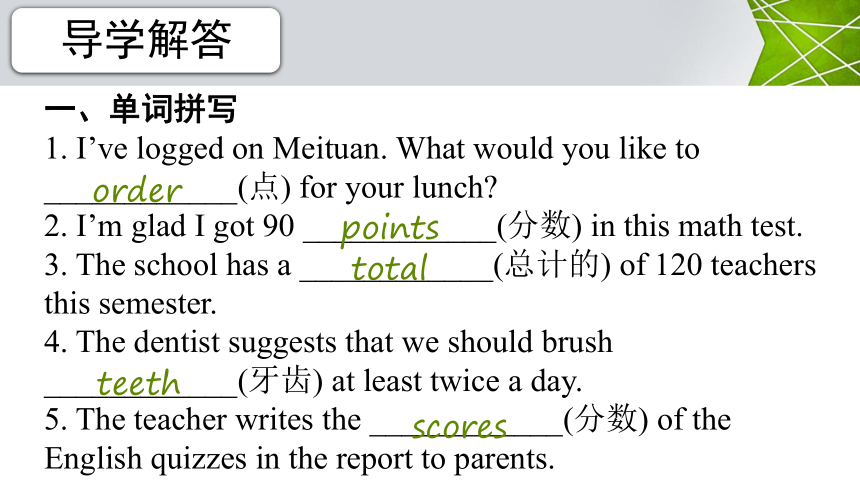
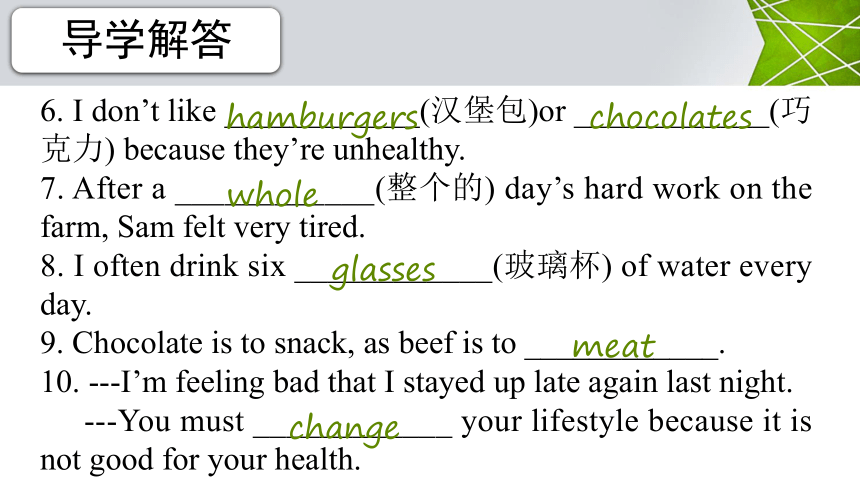
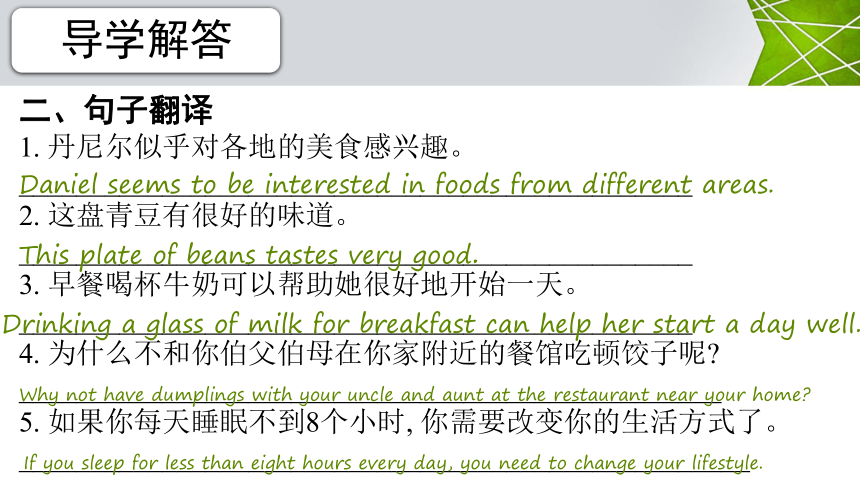
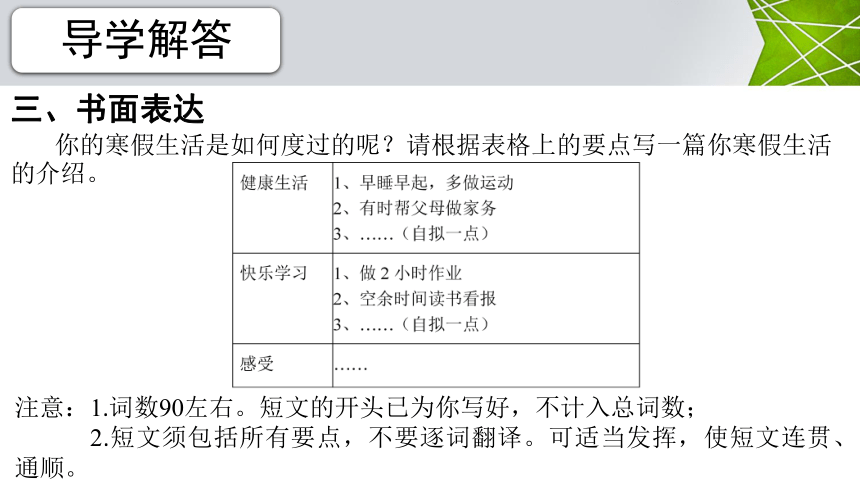
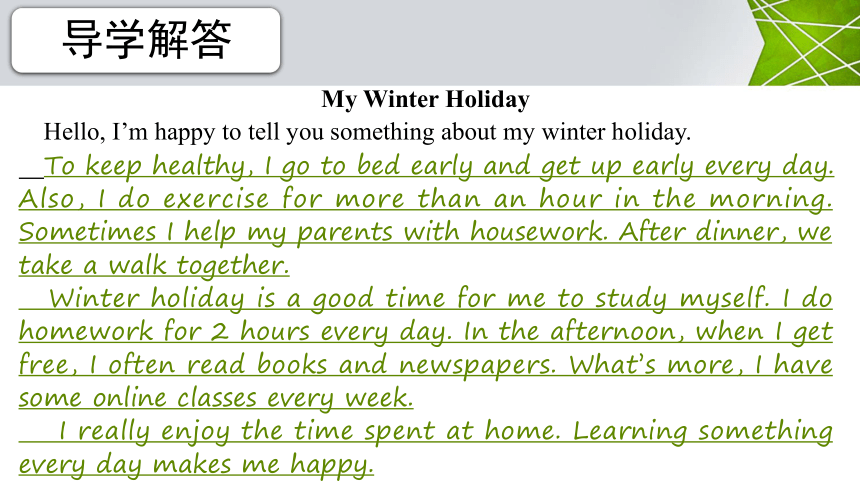
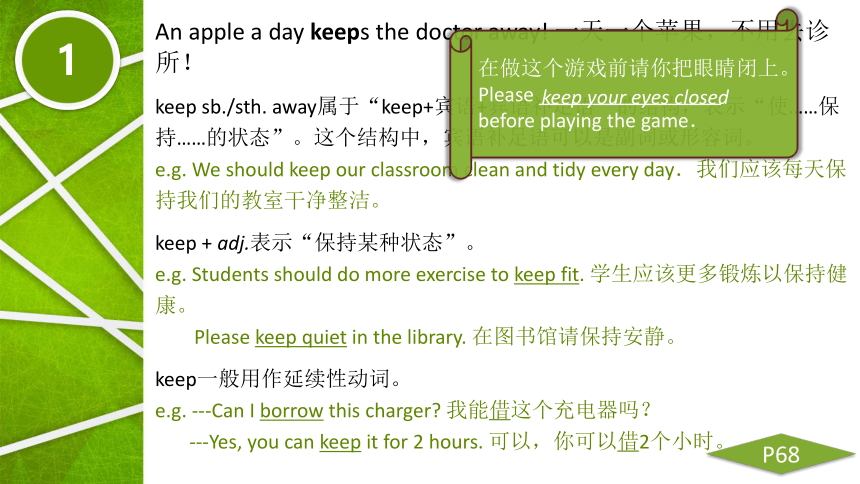
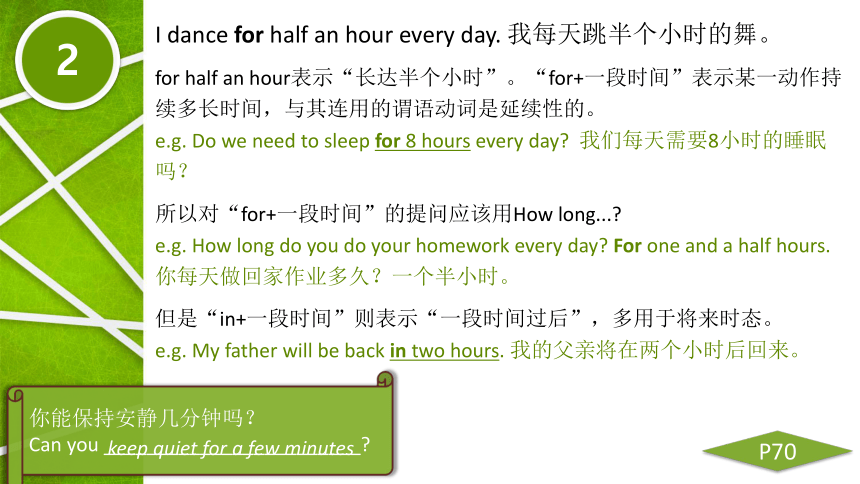
文档简介
(共20张PPT)
Unit 6 语言要点和语法拓展
Contents
导学解答
知识讲解
实战运用
1
2
3
导学解答
一、单词拼写
1. I’ve logged on Meituan. What would you like to ____________(点) for your lunch?
2. I’m glad I got 90 ____________(分数) in this math test.
3. The school has a ____________(总计的) of 120 teachers this semester.
4. The dentist suggests that we should brush ____________(牙齿) at least twice a day.
5. The teacher writes the ____________(分数) of the English quizzes in the report to parents.
order
points
total
teeth
scores
导学解答
6. I don’t like ____________(汉堡包)or ____________(巧克力) because they’re unhealthy.
7. After a ____________(整个的) day’s hard work on the farm, Sam felt very tired.
8. I often drink six ____________(玻璃杯) of water every day.
9. Chocolate is to snack, as beef is to ____________.
10. ---I’m feeling bad that I stayed up late again last night.
---You must ____________ your lifestyle because it is not good for your health.
hamburgers
chocolates
whole
glasses
meat
change
导学解答
二、句子翻译
1. 丹尼尔似乎对各地的美食感兴趣。
_______________________________________________
2. 这盘青豆有很好的味道。
_______________________________________________
3. 早餐喝杯牛奶可以帮助她很好地开始一天。
_______________________________________________
4. 为什么不和你伯父伯母在你家附近的餐馆吃顿饺子呢?
_________________________________________________
5. 如果你每天睡眠不到8个小时, 你需要改变你的生活方式了。
___________________________________________________
Daniel seems to be interested in foods from different areas.
This plate of beans tastes very good.
Drinking a glass of milk for breakfast can help her start a day well.
Why not have dumplings with your uncle and aunt at the restaurant near your home?
If you sleep for less than eight hours every day, you need to change your lifestyle.
导学解答
三、书面表达
你的寒假生活是如何度过的呢?请根据表格上的要点写一篇你寒假生活的介绍。
注意:1.词数90左右。短文的开头已为你写好,不计入总词数;
2.短文须包括所有要点,不要逐词翻译。可适当发挥,使短文连贯、通顺。
导学解答
My Winter Holiday
Hello, I’m happy to tell you something about my winter holiday.
To keep healthy, I go to bed early and get up early every day. Also, I do exercise for more than an hour in the morning. Sometimes I help my parents with housework. After dinner, we take a walk together.
Winter holiday is a good time for me to study myself. I do homework for 2 hours every day. In the afternoon, when I get free, I often read books and newspapers. What’s more, I have some online classes every week.
I really enjoy the time spent at home. Learning something every day makes me happy.
1
P68
An apple a day keeps the doctor away! 一天一个苹果,不用去诊所!
keep sb./sth. away属于“keep+宾语+宾语补足语”的结构,表示“使……保持……的状态”。这个结构中,宾语补足语可以是副词或形容词。
e.g. We should keep our classroom clean and tidy every day.我们应该每天保持我们的教室干净整洁。
keep + adj.表示“保持某种状态”。
e.g. Students should do more exercise to keep fit. 学生应该更多锻炼以保持健康。
Please keep quiet in the library. 在图书馆请保持安静。
keep一般用作延续性动词。
e.g. ---Can I borrow this charger? 我能借这个充电器吗?
---Yes, you can keep it for 2 hours. 可以,你可以借2个小时。
在做这个游戏前请你把眼睛闭上。
Please _________________ before playing the game.
keep your eyes closed
2
P70
I dance for half an hour every day. 我每天跳半个小时的舞。
for half an hour表示“长达半个小时”。“for+一段时间”表示某一动作持续多长时间,与其连用的谓语动词是延续性的。
e.g. Do we need to sleep for 8 hours every day? 我们每天需要8小时的睡眠吗?
所以对“for+一段时间”的提问应该用How long...?
e.g. How long do you do your homework every day? For one and a half hours. 你每天做回家作业多久?一个半小时。
但是“in+一段时间”则表示“一段时间过后”,多用于将来时态。
e.g. My father will be back in two hours. 我的父亲将在两个小时后回来。
你能保持安静几分钟吗?
Can you ________________________?
keep quiet for a few minutes
3
P70
Sometimes I feel hungry between meals, so I eat an apple or a pear. 有时,我在两餐之间感到饥饿,所以我吃一个苹果或梨。
between meals表示“在两餐之间”。between为介词,后面接代词时,要用代词的宾格形式。
e.g. Between you and him, there’s a mirror. 在你和他之间有一面镜子。
在表示两个同类人或物之间,介词between后用名词的复数形式。
e.g. My Art teacher asks me to put the card between the two pieces of paper. 美术老师要求我把卡片放在两张纸之间。
在两课之间,我们喜欢和好朋友聊天、做游戏。
_____________, we like chatting with good friends and playing games.
Between classes
4
P70
They have too much sugar and are bad for my teeth. 它们有太多的糖分,对我的牙齿有害。
too much表示“太多”,放在不可数名词前,
e.g. Today we have too much homework. 今天我们有太多的回家作业。
too much还可以放在动词后面做状语,
e.g. He often thinks too much. 他经常想多了。
much too意为“过分,非常,太”,隐含了过分而不恰当之意。much too用作状语,一般修饰形容词或副词,不可用来修饰动词。
e.g. This question is much too difficult. 这个问题太难了。
区别两者的用法请记住“中心词”:too much中的中心词是much;much too中心词是too。much修饰不可数名词或动词;too修饰形容词或副词。
They walked ____ far, so they don’t have ____ energy now.
A. too much; too much
B. too much; much too
C. much too; much too
D. much too; too much
5
P70
I plan to eat more fruit and vegetables every day. 我计划每天多吃水果和蔬菜。
plan v.意为“计划,打算”。plan sth.表示“计划某事”,plan to do sth.表示“计划做某事”。
e.g. Do the Smiths plan a trip to London? 史密斯一家计划去伦敦旅行吗?
We plan to have a party for your birthday. 我们打算为你的生日举办一个聚会。
plan n. 还可以用作名词,意为“打算,计划”。
e.g. Thank you for helping me make a study plan! 感谢你帮我制定一个学习计划!
她计划每周游泳和跳舞。
She __________________ and dance every week.
plans to go swimming
6
P74
Mum, what do we need to buy? 妈妈,我们需要买什么?
在这里need做实意动词,和其他实意动词一样,need后接不定式短语,即need to do sth,表示“需要做某事”。变成疑问句时,need不能直接用于句首,需要借助动词do/does/did。
e.g. Does she need any help? 她需要一些帮助吗?
It’s very cold outside. You need to wear warm clothes. 外面天气很冷,你需要穿暖和的衣服。
need也可以作情态动词,表示“需要,必须”,通常用于否定句和疑问句中。
e.g. You needn’t do it again. 你不需要再做了。
Need they stay in the classroom for 2 hours? 他们需要在教室里待2个小时吗?
我需要许多能量来度过整个下午。
I ________________ for the whole afternoon.
need lots of energy
7
P75
less than 3 times a week 一周少于三次
less than 表示“少于,小于”,用于数量、时间、金钱、距离等的比较,后面可以接可数名词。
e.g. He has less than ten books. 他有不到十本书。
反义短语为more than“超过,超出”。
e.g. He spends more than two hours watching TV every day. 他每天花费两个多小时看电视。
我一天的睡眠时间不到八小时。
I sleep _________________ every day.
less than eight hours
8
P76
Apple juice tastes good. 苹果汁味道不错。
句中的taste为系动词,意思为“尝起来…”,后面接形容词做表语。
e.g. The pork doesn’t taste very fresh. 这些猪肉吃起来不新鲜了。
在英语中类似的系动词还有look, feel, sound, smell等,我们把这类系动词称为感官动词。
e.g. He looks very tired.他看起来很累。
The song sounds beautiful. 那首歌听起来优美。
Does the toy cat feel soft? 那只玩具猫摸上去柔软吗?
The mangoes don’t smell good. 这些芒果不好闻。
这类感官动词后面也可以接介词like,表示“...像...”。
e.g. Low-fat milk tastes like water. 低脂牛奶喝起来像水。
这盘子水果吃起来如何?
_____ does the plate of fruits _____ ?
How
taste
9
P78
This meal gives me energy for the whole afternoon. 这顿饭为我整个下午提供能量。
这里的whole表示“整个的”,作形容词,放在所修饰名词前。
e.g. Mom needs a whole loaf of bread to cook breakfast. 妈妈需要一整条面包来烧早饭。
Lots of people spend their whole holiday at home this year. 许多人今年在家度过整个假期。
在英语中whole也可以作名词,意为“整体,全部”。
e.g. How big is that part compared to the whole? 较之整体,那个部分有多大?
整个国家的人民对Kobe Bryant的离去感到悲伤不已。
People of _______________ felt very sad about the loss of Kobe Bryant.
the whole country
all the country
10
可数名词和不可数名词的几点注意
1. 复合名词变成复数时,一般只要把主要的名词变成复数,而当man,woman作宾语修饰另一个名词变成复数形式时,修饰词和被修饰词的名词都用复数。apple tree – apple trees girl student – girl students man doctor – men doctors woman teacher – women teachers
2. police,people等名词的单数形式表示复数意义。
e.g. The police are running after a thief. 警察在追小偷。
3. glasses,trousers,clothes等名词通常在句中用复数形式。
e.g. His trousers are too short. 他的裤子太短了。
4. the + 姓氏名词的复数形式,表示“…一家人”,其做句子主语时,谓语动词用复数。
e.g. The Greens are watching NBA games on TV now. 格林一家正在电视上收看NBA比赛。
实战运用
1. Do you like drinking ____ orange juice?
A. the B. a C. / D. an
2. My brother ____ help with his lessons, he ____ help me with my lessons.
A. doesn’t need; need to B. needn’t; need
C. doesn’t need; needs to D. needn’t; needs to
3. ---Are there any ____ in the cart? ---Yes, there are eight.
A. tomatoes B. bread C. cabbage D. chicken
4. I like to eat ____, but unfortunately, there ____ in the river.
A. fish; isn’t much fish B. fish; aren’t many fish
C. fishes; aren’t many fishes D. fishes; isn’t many fish
5. Do you eat ____ sweets and chocolates?
A. too many B. many too C. too much D. much too
6. ____ great fun it is to go snow-shoeing in the mountains with you!
A. What a B. How C. What D. How a
实战运用
1. We must keep _______(健康的) first, and then we can study well.
2. There is too much ______(糖) but too little ____(盐) in the soup.
3. What is the total _______(数量)of the students in your class?
4. I have a sweet ______(牙齿) so I eat sweet food a lot.
5. You can see some _______(鸡) in the picture. They are super cute.
6. ---Is there any beef on the children’s _____?
---Yes. We have many beef dishes for lunch.
healthy
sugar
salt
number
menu
chickens
tooth
Thank you for watching!
Unit 6 语言要点和语法拓展
Contents
导学解答
知识讲解
实战运用
1
2
3
导学解答
一、单词拼写
1. I’ve logged on Meituan. What would you like to ____________(点) for your lunch?
2. I’m glad I got 90 ____________(分数) in this math test.
3. The school has a ____________(总计的) of 120 teachers this semester.
4. The dentist suggests that we should brush ____________(牙齿) at least twice a day.
5. The teacher writes the ____________(分数) of the English quizzes in the report to parents.
order
points
total
teeth
scores
导学解答
6. I don’t like ____________(汉堡包)or ____________(巧克力) because they’re unhealthy.
7. After a ____________(整个的) day’s hard work on the farm, Sam felt very tired.
8. I often drink six ____________(玻璃杯) of water every day.
9. Chocolate is to snack, as beef is to ____________.
10. ---I’m feeling bad that I stayed up late again last night.
---You must ____________ your lifestyle because it is not good for your health.
hamburgers
chocolates
whole
glasses
meat
change
导学解答
二、句子翻译
1. 丹尼尔似乎对各地的美食感兴趣。
_______________________________________________
2. 这盘青豆有很好的味道。
_______________________________________________
3. 早餐喝杯牛奶可以帮助她很好地开始一天。
_______________________________________________
4. 为什么不和你伯父伯母在你家附近的餐馆吃顿饺子呢?
_________________________________________________
5. 如果你每天睡眠不到8个小时, 你需要改变你的生活方式了。
___________________________________________________
Daniel seems to be interested in foods from different areas.
This plate of beans tastes very good.
Drinking a glass of milk for breakfast can help her start a day well.
Why not have dumplings with your uncle and aunt at the restaurant near your home?
If you sleep for less than eight hours every day, you need to change your lifestyle.
导学解答
三、书面表达
你的寒假生活是如何度过的呢?请根据表格上的要点写一篇你寒假生活的介绍。
注意:1.词数90左右。短文的开头已为你写好,不计入总词数;
2.短文须包括所有要点,不要逐词翻译。可适当发挥,使短文连贯、通顺。
导学解答
My Winter Holiday
Hello, I’m happy to tell you something about my winter holiday.
To keep healthy, I go to bed early and get up early every day. Also, I do exercise for more than an hour in the morning. Sometimes I help my parents with housework. After dinner, we take a walk together.
Winter holiday is a good time for me to study myself. I do homework for 2 hours every day. In the afternoon, when I get free, I often read books and newspapers. What’s more, I have some online classes every week.
I really enjoy the time spent at home. Learning something every day makes me happy.
1
P68
An apple a day keeps the doctor away! 一天一个苹果,不用去诊所!
keep sb./sth. away属于“keep+宾语+宾语补足语”的结构,表示“使……保持……的状态”。这个结构中,宾语补足语可以是副词或形容词。
e.g. We should keep our classroom clean and tidy every day.我们应该每天保持我们的教室干净整洁。
keep + adj.表示“保持某种状态”。
e.g. Students should do more exercise to keep fit. 学生应该更多锻炼以保持健康。
Please keep quiet in the library. 在图书馆请保持安静。
keep一般用作延续性动词。
e.g. ---Can I borrow this charger? 我能借这个充电器吗?
---Yes, you can keep it for 2 hours. 可以,你可以借2个小时。
在做这个游戏前请你把眼睛闭上。
Please _________________ before playing the game.
keep your eyes closed
2
P70
I dance for half an hour every day. 我每天跳半个小时的舞。
for half an hour表示“长达半个小时”。“for+一段时间”表示某一动作持续多长时间,与其连用的谓语动词是延续性的。
e.g. Do we need to sleep for 8 hours every day? 我们每天需要8小时的睡眠吗?
所以对“for+一段时间”的提问应该用How long...?
e.g. How long do you do your homework every day? For one and a half hours. 你每天做回家作业多久?一个半小时。
但是“in+一段时间”则表示“一段时间过后”,多用于将来时态。
e.g. My father will be back in two hours. 我的父亲将在两个小时后回来。
你能保持安静几分钟吗?
Can you ________________________?
keep quiet for a few minutes
3
P70
Sometimes I feel hungry between meals, so I eat an apple or a pear. 有时,我在两餐之间感到饥饿,所以我吃一个苹果或梨。
between meals表示“在两餐之间”。between为介词,后面接代词时,要用代词的宾格形式。
e.g. Between you and him, there’s a mirror. 在你和他之间有一面镜子。
在表示两个同类人或物之间,介词between后用名词的复数形式。
e.g. My Art teacher asks me to put the card between the two pieces of paper. 美术老师要求我把卡片放在两张纸之间。
在两课之间,我们喜欢和好朋友聊天、做游戏。
_____________, we like chatting with good friends and playing games.
Between classes
4
P70
They have too much sugar and are bad for my teeth. 它们有太多的糖分,对我的牙齿有害。
too much表示“太多”,放在不可数名词前,
e.g. Today we have too much homework. 今天我们有太多的回家作业。
too much还可以放在动词后面做状语,
e.g. He often thinks too much. 他经常想多了。
much too意为“过分,非常,太”,隐含了过分而不恰当之意。much too用作状语,一般修饰形容词或副词,不可用来修饰动词。
e.g. This question is much too difficult. 这个问题太难了。
区别两者的用法请记住“中心词”:too much中的中心词是much;much too中心词是too。much修饰不可数名词或动词;too修饰形容词或副词。
They walked ____ far, so they don’t have ____ energy now.
A. too much; too much
B. too much; much too
C. much too; much too
D. much too; too much
5
P70
I plan to eat more fruit and vegetables every day. 我计划每天多吃水果和蔬菜。
plan v.意为“计划,打算”。plan sth.表示“计划某事”,plan to do sth.表示“计划做某事”。
e.g. Do the Smiths plan a trip to London? 史密斯一家计划去伦敦旅行吗?
We plan to have a party for your birthday. 我们打算为你的生日举办一个聚会。
plan n. 还可以用作名词,意为“打算,计划”。
e.g. Thank you for helping me make a study plan! 感谢你帮我制定一个学习计划!
她计划每周游泳和跳舞。
She __________________ and dance every week.
plans to go swimming
6
P74
Mum, what do we need to buy? 妈妈,我们需要买什么?
在这里need做实意动词,和其他实意动词一样,need后接不定式短语,即need to do sth,表示“需要做某事”。变成疑问句时,need不能直接用于句首,需要借助动词do/does/did。
e.g. Does she need any help? 她需要一些帮助吗?
It’s very cold outside. You need to wear warm clothes. 外面天气很冷,你需要穿暖和的衣服。
need也可以作情态动词,表示“需要,必须”,通常用于否定句和疑问句中。
e.g. You needn’t do it again. 你不需要再做了。
Need they stay in the classroom for 2 hours? 他们需要在教室里待2个小时吗?
我需要许多能量来度过整个下午。
I ________________ for the whole afternoon.
need lots of energy
7
P75
less than 3 times a week 一周少于三次
less than 表示“少于,小于”,用于数量、时间、金钱、距离等的比较,后面可以接可数名词。
e.g. He has less than ten books. 他有不到十本书。
反义短语为more than“超过,超出”。
e.g. He spends more than two hours watching TV every day. 他每天花费两个多小时看电视。
我一天的睡眠时间不到八小时。
I sleep _________________ every day.
less than eight hours
8
P76
Apple juice tastes good. 苹果汁味道不错。
句中的taste为系动词,意思为“尝起来…”,后面接形容词做表语。
e.g. The pork doesn’t taste very fresh. 这些猪肉吃起来不新鲜了。
在英语中类似的系动词还有look, feel, sound, smell等,我们把这类系动词称为感官动词。
e.g. He looks very tired.他看起来很累。
The song sounds beautiful. 那首歌听起来优美。
Does the toy cat feel soft? 那只玩具猫摸上去柔软吗?
The mangoes don’t smell good. 这些芒果不好闻。
这类感官动词后面也可以接介词like,表示“...像...”。
e.g. Low-fat milk tastes like water. 低脂牛奶喝起来像水。
这盘子水果吃起来如何?
_____ does the plate of fruits _____ ?
How
taste
9
P78
This meal gives me energy for the whole afternoon. 这顿饭为我整个下午提供能量。
这里的whole表示“整个的”,作形容词,放在所修饰名词前。
e.g. Mom needs a whole loaf of bread to cook breakfast. 妈妈需要一整条面包来烧早饭。
Lots of people spend their whole holiday at home this year. 许多人今年在家度过整个假期。
在英语中whole也可以作名词,意为“整体,全部”。
e.g. How big is that part compared to the whole? 较之整体,那个部分有多大?
整个国家的人民对Kobe Bryant的离去感到悲伤不已。
People of _______________ felt very sad about the loss of Kobe Bryant.
the whole country
all the country
10
可数名词和不可数名词的几点注意
1. 复合名词变成复数时,一般只要把主要的名词变成复数,而当man,woman作宾语修饰另一个名词变成复数形式时,修饰词和被修饰词的名词都用复数。apple tree – apple trees girl student – girl students man doctor – men doctors woman teacher – women teachers
2. police,people等名词的单数形式表示复数意义。
e.g. The police are running after a thief. 警察在追小偷。
3. glasses,trousers,clothes等名词通常在句中用复数形式。
e.g. His trousers are too short. 他的裤子太短了。
4. the + 姓氏名词的复数形式,表示“…一家人”,其做句子主语时,谓语动词用复数。
e.g. The Greens are watching NBA games on TV now. 格林一家正在电视上收看NBA比赛。
实战运用
1. Do you like drinking ____ orange juice?
A. the B. a C. / D. an
2. My brother ____ help with his lessons, he ____ help me with my lessons.
A. doesn’t need; need to B. needn’t; need
C. doesn’t need; needs to D. needn’t; needs to
3. ---Are there any ____ in the cart? ---Yes, there are eight.
A. tomatoes B. bread C. cabbage D. chicken
4. I like to eat ____, but unfortunately, there ____ in the river.
A. fish; isn’t much fish B. fish; aren’t many fish
C. fishes; aren’t many fishes D. fishes; isn’t many fish
5. Do you eat ____ sweets and chocolates?
A. too many B. many too C. too much D. much too
6. ____ great fun it is to go snow-shoeing in the mountains with you!
A. What a B. How C. What D. How a
实战运用
1. We must keep _______(健康的) first, and then we can study well.
2. There is too much ______(糖) but too little ____(盐) in the soup.
3. What is the total _______(数量)of the students in your class?
4. I have a sweet ______(牙齿) so I eat sweet food a lot.
5. You can see some _______(鸡) in the picture. They are super cute.
6. ---Is there any beef on the children’s _____?
---Yes. We have many beef dishes for lunch.
healthy
sugar
salt
number
menu
chickens
tooth
Thank you for watching!
同课章节目录
- 预备课程
- Lesson 1 Nice to meet you !
- Lesson 2 A happy family
- Lesson 3 A nice school
- Lesson 4 You look cool !
- Lesson 5 Wonderful things
- Lesson 6 Have nice food
- Lesson 7 Enjoy our days
- Lesson 8 Let's have fun !
- Unit 1 This is me
- Unit 2 Let's play sports
- Unit 3 Welcome to our school
- Unit 4 My day
- Unit 5 Let’s celebrate
- Unit 6 Food and lifestyle
- Unit 7 Shopping
- Unit 8 Fashion
